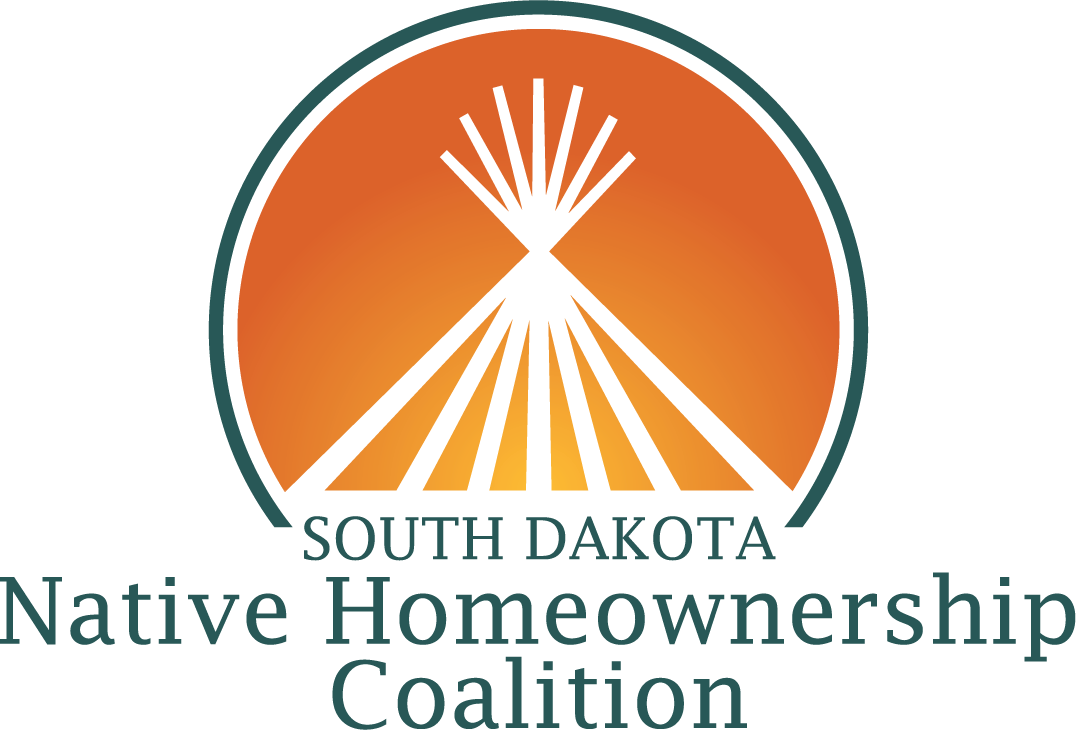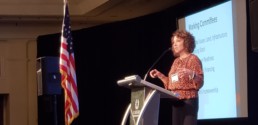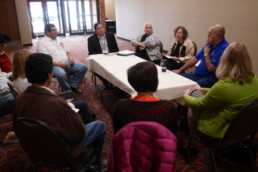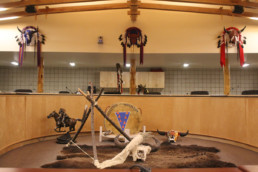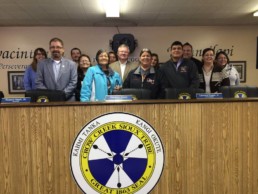Pilot Program Increases Rates of Mortgage Lending on South Dakota’s Reservations
During her address at the National American Indian Housing Council’s Legal Symposium, Tawney Brunsch, Executive Committee Member of the South Dakota Native Homeownership Coalition, reported that through a partnership with USDA Rural Development, two Native community development financial institutions (CDFIs) deployed eight home loans totaling nearly $1 million in two reservation communities during the past couple of months – more than was deployed in the previous nine years prior to the start of the program.
USDA Rural Development officially launched the 502 Direct Native CDFI Relending Pilot Program last summer as a way to increase homeownership opportunities on tribal lands, and approval of funds for deployment began in October this year.
“The 502 Relending Pilot has been a huge success! USDA, the South Dakota Native Homeownership Coalition, and the Native CDFIs have worked together to efficiently expand access to affordable mortgage capital to Native borrowers on trust land,” said Brunsch.
In just two months, the two Native CDFIs participating in the pilot, Four Bands Community Fund on the Cheyenne River Reservation and Mazaska Owecaso Otipi Financial on the Pine Ridge Reservation, have deployed approximately 50% of the $2 million in loan capital that was allocated to the pilot program and are currently working with 24 more families who are applying for the USDA 502 Direct Loan.
“This deployment rate shows that Native CDFIs are able to leverage their strong relationships within the communities they serve and their expertise in mortgage lending processes on tribal trust lands to accelerate homeownership rates on Indian reservations,” explains Brunsch.
The South Dakota Native Homeownership Coalition began advocating for the pilot program in 2015 and worked closely with U.S. Senator John Thune (R-SD), U.S. Senator Mike Rounds (R-SD), and U.S. Senator John Hoeven (R-ND). In March 2018, the South Dakota congressional delegation requested that USDA implement the pilot and recognized that while the 502 Direct Loan program was highly utilized, only 23 of the 7,187 loans made through the program in fiscal year 2017 went to Native American families on tribal lands.
Brunsch says the South Dakota Native Homeownership Coalition’s next step will be continued advocacy with the intention of making the pilot permanent so that it can be expanded to other Native communities throughout the country.
“We appreciate the leadership of our Senators who made this pilot possible and are excited to partner with the National American Indian Housing Council, National Congress of American Indians, and the Native CDFI Network to support the replication of this successful model in all Native communities,” Brunsch said.
Coalition Advocates for Native Homeownership in Washington DC
During the National American Indian Housing Council’s 2018 Legislative Conference, March 5-7 in Washington, DC, the South Dakota Native Homeownership Coalition mobilized a group of advocates that engaged in dialogue with numerous congressional representatives and federal agencies. This year’s group of advocates demonstrated a diverse representation of reservation communities, and included Tribally Designated Housing Entities, Tribal Veterans Service Officers, and partners from Cheyenne River, Lower Brule, Rosebud, Sisseton, Standing Rock, and Yankton.
During the DC trip, we met with Tara Sweeney, Assistant Secretary – Indian Affairs Department of the Interior to discuss the Bureau of Indian Affairs residential lease, mortgage, and Title Status Report approval processes. We urged the Assistant Secretary to streamline these processes, especially the Land Title Records Offices, which are not designed to accommodate the pace of the residential real estate market.
Other highlights included:
Providing updates on the USDA 502 Relending Pilot, and advocating to make it a permanent program for Native communities nationwide. We shared progress on the 502 Relending Pilot, currently being implemented in South Dakota by Four Bands Community Fund and Mazaska Owecaso Otipi Financial, with USDA Rural Development, as well as staff from Senator Mike Rounds (R-SD), Senator John Thune (R-SD), and Senator John Hoeven (R-ND), who were all instrumental in launching the pilot. Senator Hoeven even mentioned the 502 Relending Program in his address to the NAIHC Legislative Conference.
Meeting with the US Department of Veterans Affairs to discuss ways to streamline the Native American Direct Loan process in order to expand homeownership opportunities for Native American veterans on trust land. We proposed several policy recommendations that would expand outreach and assistance to Native veterans, design a loan packaging program, and pilot a relending demonstration, similar to the 502 Relending Pilot. We also advocated for these policies in our meeting with Senator Rounds’ Senate Committee on Veterans Affairs staff.
Sharing opportunities and challenges associated with Native homeownership with HUD Office of Native American Programs.We met with Deputy Assistant Secretary Heidi Frechette to advocate for solutions that would streamline processes and increase homeownership opportunities for Native Americans. Specifically, we discussed improving the implementation of HUD VASH vouchers, issues with the HUD Section 184 Indian Home Loan program, and BIA issues.
Meeting with Administration for Native Americans (ANA) Commissioner Jeannie Hovland and her staff to learning about how ANA’s programs could benefit the members of the Coalition.
Coalition Celebrates USDA 502 Relending Pilot
The US Department of Agriculture’s Assistant to the Secretary for Rural Development, Anne Hazlett visited the Pine Ridge Reservation to meet with Four Bands Community Fund, Mazaska Owecaso Otipi Financial, and other regional partners to discuss the launch of a pilot program to increase homeownership opportunities on tribal lands. Through the 502 Relending Pilot, USDA Rural Development is partnering with Four Bands and Mazaska, both Native community development financial institutions and active Coalition members, to deploy a total of $2,000,000 to eligible Native American homebuyers located in tribal communities of South Dakota and North Dakota. According to USDA, the CDFIs’ deep ties in local communities will help them to reach homebuyers more effectively than other lenders.
The Coalition is excited to see this new development and has been actively advocating for this model as a solution to increase access to USDA’s home loan programs for Native American families. Our efforts, led by our Policy Committee Co-chairpersons, JC Crawford and Sharon Vogel, have included engaging partners and policy makers in various meetings and briefings over the past four-plus years. By creating alliances and identifying champions, we continued to raise awareness of challenges and opportunities related to homeownership and Native American communities.
We’d like to express our gratitude especially to U.S. Senator John Thune (R-SD), as well as U.S. Senator Mike Rounds (R-SD) and U.S. Representative Kristi Noem (R-SD). The South Dakota delegation requested that USDA implement the pilot and recognized that while the 502 Direct Loan program is highly utilized, only 23 of the 7,187 loans made through the program in fiscal year 2017 went to Native American families on tribal lands. We’d also like to recognize U.S. Senators John Hoeven (D-ND) and Heidi Heitkamp (D-ND) who were instrumental in launching the pilot.
The Coalition will continue working with these legislators and USDA Rural Development as the pilot experiences great success. We anticipate that the 502 Relending Program will expand throughout Indian Country and hope it will be a model for creating greater access to other federal mortgage programs on tribal lands.
Thanks to the US Department of Agriculture for contributing photos of Ms. Hazlett’s visit!
Coalition Members Head to Washington to Advocate for Native Homeownership
Earlier this month, representatives of the Coalition’s Policy Committee traveled to Washington, DC to advocate for policies to promote Native homeownership in conjunction with the National American Indian Housing Council (NAIHC) Legislative Conference. While in DC, the delegation held meetings with representatives from US Department of Housing and Urban Development, US Department of Agriculture, and US Department of Veterans Affairs (VA). The delegation discussed the proposed 502 relending demonstration (where Native CDFIs would relend 502 funds to qualified borrowers) as well the HUD 184 guaranteed loan product and strategies to increase the number of Native American Direct Loans (NADL) originated by the VA. The delegation also meet with the North Dakota and South Dakota Senators, and Senate Committee on Indian Affairs staff.
Featured in image: Members of the SD Native Homeownership Coalition met with Senator John Thune (R-SD) to discussion Native homeownership. From left to right, Mark Witt, Rosebud Tribal Veteran Service Officer (TVSO); Robert Dunsmore, Cheyenne River Sioux Tribe TVSO; Darrel Hernandez, Oglala Sioux Tribe TVSO; Senator John Thune; JC Crawford, Executive Director, Sisseton Wahpeton Housing Authority; and Joanna Donohoe, Co-Facilitator, SDNHOC.
Tribal Leaders Support Coalition’s Policy Recommendations
At its December meeting, the Great Plains Tribal Chairmen’s Association adopted two resolutions in support of the South Dakota Native Homeownership Coaltion’s policy recommendations to federal policymakers.
The first resolution supported legislative amendments to the US Department of Veterans Affairs Native American Direct Loan (NADL) program to improve homeownership opportunities for Native veterans on Indian reservations in South Dakota.
The second resolution supported other broader homeownership recommendations including:
- Support for the implementation of the USDA Rural Development 502 home loan relending pilot
- Funding for the Bureau of Indian Affairs Housing Improvement Program
- Improvements to the HUD Section 184 loan guarantee program to increase deployment on trust land
- Exploring new partnerships with Fannie Mae and Freddie Mac as part of their Duty to Serve implementation plans
The Coalition appreciates the support of Cheyenne River Sioux Tribe Chairman Harold Frazier, who introduced the resolutions. We look forward to continuing to collaborate with the Great Plains Tribal Chairmen’s Association and South Dakota’s tribal leadership and Tribal Veteran Service Officers to promote these policy changes.
Building a Foundation for Homeownership in Indian Country
While homeownership in general has been on a decline across the United States, it is increasing on reservations in South Dakota. More tribes are recognizing the capacity for homeownership to build individual and community wealth, wellness, and stability, thanks in large part to individuals from tribal communities who have become strong homeownership advocates. Homeownership advocates Sharon Vogel and JC Crawford, for example have both worked tirelessly in their respective communities to tackle the unique obstacles related to becoming a homeowner on their reservations, and others are taking notice.
Government policies that dismantled traditional ways of living in tribal communities have created a housing system that largely keeps people in a system of life-long renting, preventing families from building their personal equity and assets. As tribal communities begin to revitalize and empower themselves economically, government prescribed housing options are continuing to fall short of what many tribal housing authorities see as necessary to adequately serve their communities. Families of various income levels often compete for the same housing since a limited housing stock is available.
“The thing about housing on reservations is we focus so much on low income housing, which is necessary” says Elsie Meeks, former USDA – Rural Development State Director in South Dakota. “But we’ve also filled up a lot of houses that could have gone to low income families with people that could afford to buy homes and benefit from homeownership.”
Sharon Vogel, Executive Director of the Cheyenne River Housing Authority, sees homeownership as a strategic tool for strengthening tribal communities. Her work helps families have a comprehensive understanding of the complex process of Native homeownership and their options in accomplishing homeownership. “There are far reaching impacts of homeownership that go beyond financial benefits,” says Vogel. “Homeownership really puts families in control. People can decide everything from the location of their home to the design of it, making sure the home meets their family’s needs. Research shows that children who grow up in a family home that is owned have better outcomes in school.”
On the Sisseton Wahpeton reservation in South Dakota, Housing Authority Executive Director and homeownership advocate James “JC” Crawford also works to co-create a more successful housing system for his tribe. For instance, to address the issue of banks that were hesitant to lend in Native communities, Sisseton Wahpeton created a “risk pool” that would enable the tribe to purchase any home potentially in foreclosure, and resell the home to another tribal member. By thinking ahead, JC helped put lenders at ease and helped ensure that potential homeowners have the opportunity to build their future through homeownership.
“In Indian Country the nature of things is that ‘homeownership isn’t for us’ is a common mentality,” says Crawford, “but I think when we are looking at how we create self-sufficiency in our tribes, we are using our sovereignty to move out of the cycle of renting and into building our equity through homeownership.”
Sisseton Wahpeton Oyate Housing Authority Secures Victory Through Advocacy!
Through a persistent effort, the Sisseton Wahpeton Oyate Housing Authority has secured an important tax victory which will result in more affordable mortgages for tribal members. Through this effort, individual home buyers constructing their homes have been granted a sales tax exemption for “Indian Use Only Projects,” which means that they will not have to pay sales tax on materials used to build their homes on trust land. According to JC Crawford, Executive Director of the Sisseton Wahpeton Housing Authority, “eliminating the sales tax makes a real difference for home buyers. At the end of the day, the savings can determine whether or not one of our tribal members can qualify for their mortgage.”
Initial advocacy efforts around the sales tax provision began back in 2012, when five families building in the Long Hollow subdivision filed a request for consideration of the tax exemption – which is one-page, on-line fillable form. When their request was denied, the Sisseton Wahpeton Oyate and their legal group got involved, and the tribal chairman set up a meeting with the Governor. Following this meeting, the decision to deny the exemption request was reversed, and the exemption was granted. Through the exemption process, the contractor building the home on trust land gets a letter indicating that all materials purchased for the home will be exempt from state sales tax.
When a new group of families began home construction in June 2016, the Housing Authority assumed that based on the prior decision, their exemption requests would granted. They were surprised to learn in August 2016 that the requests were denied. The Housing Authority worked with the Sisseton Wahpeton Oyate Tax Office to begin advocacy efforts once again to secure the exemption for tribal families, and in November 2016, a tribal delegation traveled to Pierre to meet with the Secretary of the SD Department of Revenue, Andy Gerlach. In this meeting, the delegation needed to show that the tribe had involvement with families throughout the home construction and buying process. At the meeting, the decision to deny the exemption was reversed, and the exemption was granted.
According to Angie Johnson, Administrator/Counselor of the T Yamni ~ Sisseton Wahpeton Oyate, this policy victory shows the importance of “pushing forward, pushing forward, and not giving up.” She states, “What’s critical here is that we’re saving our homebuyers money. Most are low-income, and we try to save as much as we can on their home – which they’ll have for the rest of their lives.”
Coalition Sponsors “Residential Construction Roundtable”
The South Dakota Native Homeownership Coalition sponsored a residential construction roundtable in Rapid City to look at how the Coalition can support contractors’ efforts to build more homes for Native homebuyers. Over 20 participants attended the productive session, sharing challenges and strategies.
Coalition Representatives Meet with Crow Creek Tribal Council
Representatives of the South Dakota Native Homeownership Coalition addressed the Crow Creek Tribal Council and Tribally Designated Housing Entity leadership to discuss the work of the Coalition in promoting Native homeownership in South Dakota, and how the Council can support homeownership for tribal members.
